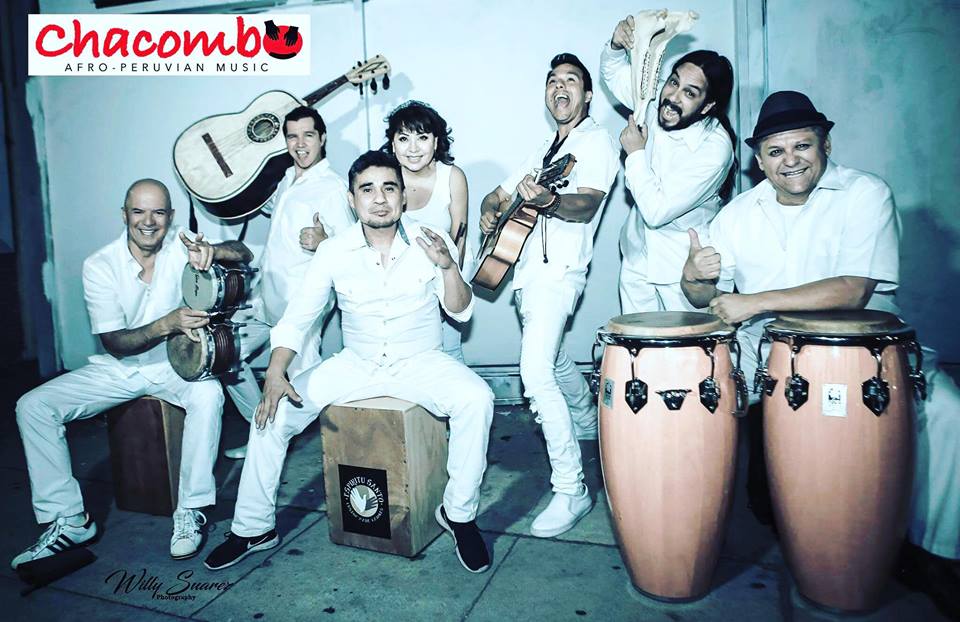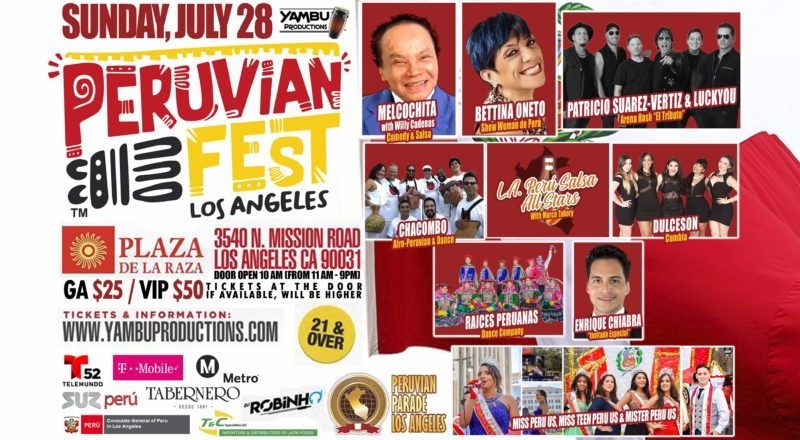INTERVIEW: Chacombo celebrate Afro-Peruvian culture
Image: Courtesy of Vesper PR / Provided with permission.
The members of the Afro-Peruvian band Chacombo have as their mission the celebrating and spreading of cultural traditions, and they accomplish this goal by performing blazing sets of music with accompanying dances for crowds of people. They’ve played universities, museums, community gatherings and private parties, and Sunday, July 28, they headline Peruvian Fest Los Angeles at La Plaza de La Raza, all in celebration of Peruvian Independence Day.
Other musicians performing at Peruvian Fest include Melcochita, Bettina Oneto, Patricio Suarez-Vertiz & Luckyou, the L.A. Peru Salsa All Stars and Dulceson.
Chacombo consists of Angelo Salazar on guitar and vocals. He also serves as the musical director of the band, which features many instrumentalists and dancers. A Chacombo concert has bass, guitar, congas, piano, bongo, cajón (box-shaped percussion instrument) and charrasca (jawbone).
“They can expect a lot of energy, enthusiasm, culture,” Salazar said of the band’s gigs. “We’re bringing all of the ancestral rhythms from Afro-Peruvian culture and combining them with modern harmonies and more contemporary elements that are now played in music.”
Chacombo have been together as a band for a couple of years now. The members, including vocalist and conga player Gino Gamboa and bassist Federico Zuniga, were playing this style of music individually within the Peruvian community of Los Angeles, and they decided to pool their resources and create a dynamic group that can surround the audience with infectious beats and rhythmic tunes.
“We all individually play this kind of music in the Peruvian community, and it was just a matter of us meshing together and deciding that we should come up with not just small gigs,” he said. “I was already playing with Gino for a while, and then I met Federico. And that opened up the spectrum because the bass player was real important in order to have a solid band with drummer, bass, guitar. We were already in the mentality, but we had not met Federico yet.”
After this central trio was formed, Salazar was able to play harmonies and add structures to their music, and little by little Chacombo started to form. The band members started making arrangements of different traditional tunes, and more people started jumping into the mix.
For Salazar, forming Chacombo has been a full-circle moment because now he’s spreading the music he first heard in the neighborhoods of Peru as a young boy.
“I grew up in Peru, so I came here when I was 12 years old,” he said. “In Peru, I was already playing keyboard. I was taking private lessons, and I was inclined to music a lot. Where I grew up, in this is old, old neighborhood … right there it’s kind of the birthplace of Música Criolla. Creole music they call it, and so I just grew up all around it. And part of that I think influenced me just by watching and hearing it. I never thought I would be playing this kind of music.”
Salazar loves playing the guitar, an instrument he called one of the best in the world. He is so impressed by the cultural versatility of the guitar; after all, many communities and neighborhoods around the world share a love for this stringed instrument.
“I mean you can take it anywhere,” he said. “You can play it anywhere, and it’s found pretty much in every single culture. It’s not like a slide guitar or a charango [Andean lute] or something more cultural that is found in a specific style of music. The guitar itself you can find everywhere. … I was 16 when I started playing, and when I hit the strings, it started vibrating my hand. And that was something new. That was something that the piano didn’t do for me or the keyboard.”
When Chacombo play a concert, there are usually many members of the Peruvian and Peruvian-American community in the crowd. However, the band has also played concerts for a diverse number of communities, where they are teaching the audience about these traditional songs, instruments and dances. Salazar loves both types of gigs.

“The crowd is very mixed,” he said. “Because we are Peruvian and we are involved with the community, we do community events where a lot of the people are mainly Peruvian, and then they maybe have a significant other that’s from Latin America or South America. But we’ve also performed at several universities where the crowd is not Peruvian at all — nobody pretty much — but everybody starts dancing. … They can expect a lot of fun, a lot of fire. Our percussion section is just on fire and blends well with the sounds of the guitar, the keyboard, the bass, and then we have vocals that are just attacking and making people move. Also Chacombo is not just the band. Chacombo is Afro-Peruvian music and dance, so we also have dancers that come out maybe every couple of songs to perform traditional dances with full-on costumes.”
As far as the future of the band, Salazar said that the members are sitting down and writing original music. Right now, they play traditional Afro-Peruvian music that has been arranged by the band members, but they want to venture into newer material.
“The next thing is just to keep sharing and spreading the love,” he said. “I want to be able to get out there to more museums, more universities, more cultural places where we can empower others to also want to embrace their culture. In this case, Afro-ethnicity is sometimes not well put in Latin America. Not everybody is aware that we have Afro-Mexican, Afro-Peruvian or many other ethnicities, so that’s one of the main purposes of the band, to be able to have a voice and empower other people to also be able to embrace their culture. And we can have more diversity in L.A. because it’s a beautiful city where we can be able to blend everything. The more we do it, I think everybody has more fun.”
By John Soltes / Publisher / John@HollywoodSoapbox.com
Chacombo will play Sunday, July 28 at 3:10 p.m. at Peruvian Fest Los Angeles. Click here for more information on the festival. Click here for more information on the band.

